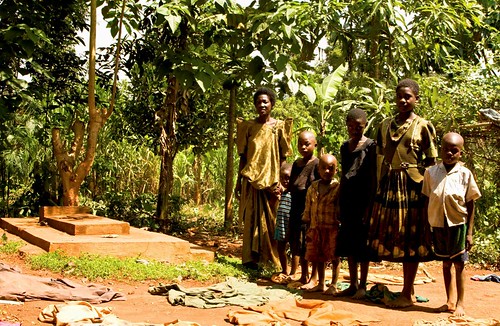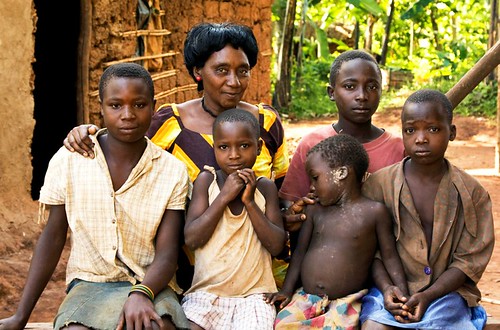
Maybe the cutest kid in the world. Ester’s niece paid us a visit earlier this week. At first Jennifer was very apprehensive around me, preferring to take dinner on the ground of a small, dimly lit back room to having me look at her at the table, but she eventually got use to my paleness and then wouldn’t leave me alone. She is extremely clever, a bit mischievous, very energetic and cute as a button, what’s not to love?
I had to start with something light before moving onto today’s real topic, HIV/AIDS.
The disease exists in America, but it is not a part of the fabric of general life. Here it is more than just a series of enigmatic letters; it is everywhere, but somewhat obscured. You hear of your neighbor dying leaving her orphans with the crippled grandmother. There are whispers of unfaithful spouses passing it to each other, and witchdoctors infecting unsuspecting female victims practicing their phony craft. And you do see it in everyday life, but mostly in absence; the almost total lack of people in the villages between the ages of 20 and 50.
It’s so common that it’s sort of just another thing. In the West we hear AIDS, and it has an aura of mystery and horror. Not here. Here it’s like, yeah, he has AIDS, or she is sick, and it’s understood to mean she is sick from AIDS. It’s so common, that if you ask an African if they would rather have AIDS or cancer, I would be very surprised if you could find one that would prefer the latter. At least there is good therapy for HIV/AIDS, not so for cancer. African cancer treatment almost exclusively involves lobbing off affected body parts; for the masses there are no oncologists, radiation treatments, chemotherapy, quality methods of testing, experimental trials, etc., just a saw and a rosary; but there are AIDS specialists, ARV drugs and HIV test kits.
Fortunately for Ugandans, they are more upfront about revealing their status compared with many other Africans. A testament to their government’s decision to combat the epidemic head on about a decade ago, while other countries, such as Kenya tried to sweep it under the rug so as not scare their population, and especially rich foreign investors and tourists. Despite the continental pandemic theoretically starting here in the 1980s, Uganda has a relatively low rate of infection, publicly around 6%, but realistically closer to 15%; some southern African countries have as much as 33% of the population infected.
Free drug therapy and counseling is available at government clinics, another reason for the relative success of controlling the disease. The international development community has really pushed treating sub-Saharan African HIV/AIDS patients in recent years, which is a wonderful, but extending someone’s life with expensive medication is really not the solution to the devastation. Here in Uganda, there is a far greater focus on treatment than prevention, which I believe is how HIV/AIDS is addressed across Africa. Prevention is of course significantly less expensive than therapy, and actually saves lives, doesn’t just prolong them; which, makes the heavy focus on treatment rather frustrating to me.
In my 10 weeks here I have yet to witness a single TV ad, radio spot, billboard, poster, anything urging practicing safe sex. I haven’t even seen any such material in the hospitals and clinics. This is just abysmal. There is not a total lack of prevention effort; for example, I believe HIV/AIDS education is a part of the every school curriculum, but in my limited experience and humble option, the prevention message is not nearly strong enough. Why wait until someone is ill to help them? Why not put more resources into preventing them from dying in the first place?
As other examples of prevention in action here, you will very rarely see condom dispensers in bathrooms, and all government clinics in theory supply them, but I have yet to see a dispenser with an actual condom in it, and Ugandans tell me that the clinics are usually out of stock as well. As additional anecdotal evidence, I recently read an article in a Ugandan newspaper written by a woman documenting her quest to find a condom one afternoon. Of course, there were none in the bathrooms, pharmacies or clinics; she had to request one from a bar and could hear the barkeep and customers snickering as she left.
And the problem extends beyond simply getting protection. Even if you have a condom, it is not always easy to persuade your partner to use it. The younger generation, particularly the educated, practice safe sex, but even among them it is not necessarily the rule. The aversion to condoms means that people continue to pass the virus freely, and given the lax attitudes about extramarital affairs, often to their spouses. How is a married woman supposed to ask her husband to use a condom? Unbelievably some, I believe few, but some even pass it knowingly, not caring if they infect others.
Another serious obstacle to prevention is religion. Some religious leaders condemn condom use, including the Pope. Africans are very spiritual and follow their religious guides in a manner unlike most Americans, where comparatively speaking modern life has greatly reduced religious power and persuasion. AIDS here is a war. No exaggeration. It kills, orphans, impoverishes, maims and scars on an incomprehensible, massive scale just like warfare, and the only way to end it at this point is through safe sex. Telling people to not use protection ensures more death and destruction, fueling the war and should honestly be a war crime. It is beyond irresponsible and insensitive to tell Africans not to use condoms. It is inhuman and criminal.
Seeing what this disease does to humanity, I feel the problem is as much ours and as theirs, and while the West offers assistance, it seems somewhat misguided. The fact of the matter is that it is difficult and uncomfortable, especially for Western countries, to address prevention issues because it means confronting sexual habits and convincing people to change; in other words, trying to alter widespread cultural practices, which sort of reeks of we’re different than you, and oh yeah, we’re also better than you, so be more like us – an attitude the Western aid workers rightfully abhor.
Foreign aid groups advertise their AIDS drugs as being inexpensive, but they usually do not provide the full details on treatment costs and challenges: the testing, counseling, other drugs required to combat infections and reduce treatment side effects, monitoring viral load and adjusting medications as necessary, etc. A few years ago the WHO estimated that it costs $1,500 to prolong the life of an AIDS patient by one year. Again, it is fantastic that the West is providing this treatment, without it there would undoubtedly be more orphans and more misery. But sadly we’ve decided for Africans that it’s easier to give them drugs when they are already sick, than talk to them about sex and condoms while they are healthy. This is dreadful, and not an excuse for not doing more in the name of prevention. If cigarette companies can still convince new smokers to buy their well-known lethal products, surely we can develop PR and community outreach campaigns that alters sexual habits to some degree. Instead foreign aid often ignores this route and privately throws their hand up in the air admonishing African culture as backwards and incorrigible.
In utter honesty, if not political correctness, African sexual practices and attitudes about protection must change to curb the pandemic that is devastating entire families, communities, the continent. Western media has rightfully highlighted the disease’s wreckage and reveals to us cold statistics and facts, but it is difficult to put it into context. Being here and seeing orphan after orphan, hearing of death after death weaves a human story into the abstract threads. I hope in the coming weeks and months to recreate what I witness here, so that you may also have some faces to coincide with the numbers.
As an introduction of what to expect, above is a picture of a woman in Wakisi with some of the grandchildren she looks after. They are standing next to their home and her son’s, their father’s grave. You surely have heard of the plight of AIDS orphans, but the other silent victims are the elderly; ill and frail and forced to look after their grandchildren after watching their own children die.









Once again, great stuff and oh so true. A the uni i went to Kenya, condoms were at the health clinic, when they got new supplies, they went quick. But once off campus, I didnt see them any where.
ReplyDelete-h